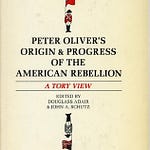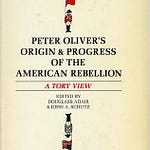This is the first chapter of the book. As Peter Oliver puts it in this chapter, it is “the porch” attached to the front of the edifice:
“Methinks Sir! I hear you ask me, why all this Introduction? Why so long a Porch before the Building is reached? Let me answer You by saying, that you desired me to give You the History of the american Rebellion, because You thought that I was intimately acquainted with the Rise & Progress of it; having lived there for so many Years, & being concerned in the publick Transactions of Government before the Rebellion burst its Crater. I was very willing to answer your request. I, on my Part, must ask you to oblige me, by permitting me, in the epistolary Walks, to indulge my Fancy in the Choice of my Path. Besides, you may perhaps, in the Sequel, find some Analogy between the Porch & the Building, & that they are not two detached Structures; altho’ a good Architect might have produced a better Effect, by making either or both of them a little more tasty. However, if you will excuse the Hibernicism, you need not enter the House by its Porch, but open the Door of the main Building which hangs at the End of the Porch, & adjoins to it.”
Including the introduction from the Editors, the book is nine chapters. While it is not long in terms of word count, it is dense. This is a window back to a time I find more compelling and curious as I grow older. This man lead a fascinating life, inclusive of the years prior to the “american Rebellion,” and his front row seat to the birth of my country is priceless. We, you and I and Brother Jonathan besides, can have any opinion we’d like about “the Revolution” and the men that fomented it. We can spar online and in print about what it was that “the Founders” meant or wanted. But for Oliver, this was the rending of his world.
And it was a beautiful world. He was a significant chunk of a large and storied foundation upon which many lives and fortunes rested. His family, his kin, and his ilk were the men upon which society relied, or railed, and their women were the keepers of hearth and home that bred a nascent aristocracy in a savage land of fright and opportunity. As I alluded to in the previous post, our perceptions of these times and their inhabitants are horribly tortured, bearing miniscule resemblance to the actuality, and Oliver’s thoughts, claims, and opinions are a keyhole view on this occluded era.
Now, I am biased. I am of Tory stock, and it could very well be that my blood is not so far from Oliver’s. But my ancestors did not retire to sunny London Towne to while away their remainder of days. In Oliver’s words:
“I live in a retired Part of the Town, clean, healthy & free from Noise; the Doctorand his Family with me; many of our New England Acquaintance nigh me & the rest I can see every Day. I can at once burst into the Bustle of Life or remain in a still & almost rural Retreat. The Amusements & Instructions of are easily entered into, or I can entertain my self, undisturbed, with my Book; every Thing is upon such an extensive Scale, that a Person must be compleately stupid to wear out Life in Complaints of having nothing to do.”1
That sounds pleasant. My ancestors fled to Nova Scotia, the ones that weren’t dead or indentured. There is a necessary divide between the High Ones and the Help. Oliver is a true aristocrat, and this shines through in so many ways in the text. As I work through these pages I cannot help but wonder what might have been, had a few malingerers, ne’er-do-wells, and Protestants not decided to touch off a rebellion. Would there have been American regiments in the King’s Army fighting Napoleon? Would doughty mountain boys have stood with the English against savage black Africans? Would North America be split into a handful of colonies and territories representing all the brightest lights of European Monarchy? And what might have happened if all the manumitted negro slaves been repatriated at the command of the Crown?
Fanciful and far-fetched thoughts, no doubt. But there is a real and stubborn question that continues to beguile me: will we ever see a true American Aristocracy? Sometimes I think this is the missing ingredient, the thing that keeps us trapped as a suicidal and misguided “great experiment in democracy.” The rebels won, and in winning they birthed a nation that has come to dominate the planet. But I don’t know how they’d feel if we could tell them that the nation they created has made the export of abortion, sodomy, and tchotchkes its primary concern and reason for existing.
We find ourselves in a grand historical moment. This is a time when a seething resentment between two groups of elites could escalate into full blown war that births an entirely unexpected and unpredictable change in the general progression of events. I encourage you to try and look through Oliver’s eyes, to see things now as he might, whether you are a part of the status quo, or railing against it. 230 years seems like a very long time ago, but if you are listening to his words, you should see that the White mind of the 1790s is not only very relatable, it was contending with forces and factors in no way dissimilar from that with which we contend now. I strongly believe there are valuable lessons for us in the pages of this book, and a few others I have on my shelf.
A good and close friend of mine once said, “It may be that 250 years of sham democracy in America is nothing more than a brief pause between thousand year stretches of ever more powerful monarchical systems.”
I think about that a lot.
Peter Oliver to Polly Watson Hutchinson, April 2, 1777




Share this post